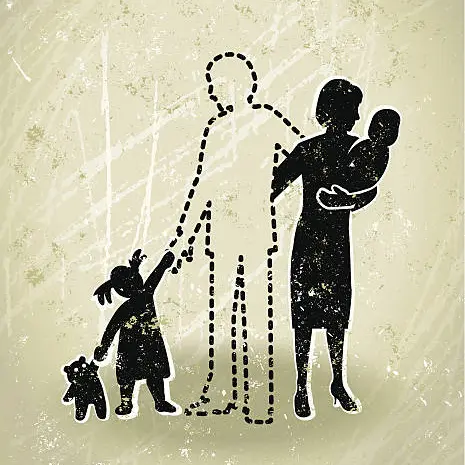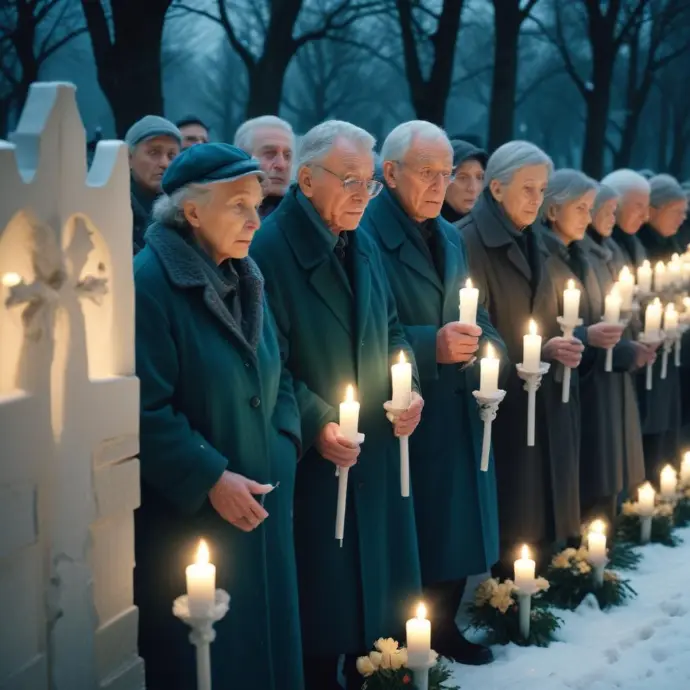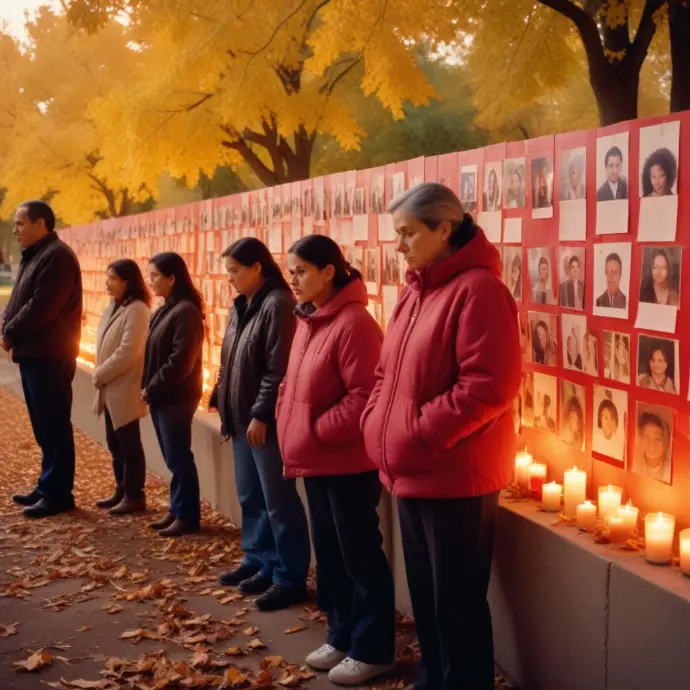
Disappeared: The painful legacy of dictatorships in the search for justice
In our website "Disappeared: The Painful Legacy of Dictatorships in the Search for Justice," we explore in depth the impact of dictatorships on the disappearance of people and the tireless effort to find justice. Prepare to dive into an in-depth analysis that reveals the constant struggle for truth and reparation. Are you ready to discover the truth behind the disappeared and their tireless search for justice? Let's delve into this crucial topic together!
Back to pageIntroduction
Eastern Europe has witnessed numerous dictatorships throughout its history, each with its own legacy of repression and human rights violations. For much of the 20th century, countries such as Hungary, Poland, Romania, and the former Czechoslovakia were under dictatorial regimes that restricted the civil and political liberties of their citizens. These dictatorships, in their eagerness to maintain control, carried out arbitrary arrests, torture, and extrajudicial executions, leaving a legacy of fear and repression in society.
The fall of the Iron Curtain brought with it the transition to democracy in many of these countries, but the legacy of these dictatorships remains present in the collective memory and in the struggles for justice and reparation for the victims.
The search for truth and justice regarding the crimes committed during these dictatorships has been a constant challenge, and the issue of the disappeared is a painful example of the struggle for historical memory and reparation for the victims and their families.
During the dictatorships in Eastern Europe, the human rights situation was precarious and marked by state repression. Freedom of expression, association, and assembly were severely restricted, and political dissent was harshly repressed. Dictatorial regimes used censorship, surveillance, and violence to silence any voice opposing the established power.
The lack of judicial independence and the systematic use of torture undermined any possibility of defending human rights. Human rights defenders and activists faced persecution, arbitrary detention, and, in many cases, enforced disappearance in retaliation for their activities in favor of justice and freedom.
The impunity prevailing during these dictatorships allowed crimes against humanity to go unpunished, perpetuating a climate of fear and mistrust in society.
Enforced disappearances during dictatorships in Eastern Europe left a profound impact on society, generating a painful legacy of uncertainty and suffering for the families of the disappeared. The practice of enforced disappearance, used as a tool of political repression, had devastating consequences on the lives of thousands of people.
The psychological and emotional impact on the families of the disappeared is incalculable. The lack of information about the whereabouts and fate of their loved ones generated prolonged anguish and intractable grief. The fight for truth and justice became a vital cause for these families, who for decades have raised their voices demanding answers and reparations.
The legacy of enforced disappearances during dictatorships in Eastern Europe remains an open wound in the search for justice and historical memory, and its impact endures in society today, fueling the commitment to defending human rights and preventing future abuses.
Enforced Disappearances During Dictatorships in Eastern Europe
Enforced disappearances refer to the detention, abduction, or any other form of deprivation of liberty by agents of the State or with its authorization, followed by a refusal to acknowledge the deprivation of liberty or concealment of the person's whereabouts, placing them beyond the protection of the law. This horrific crime against human rights has left a painful legacy in Eastern Europe, where numerous people disappeared during the dictatorships that ravaged the region in the past.
Eastern Europe has witnessed numerous cases of enforced disappearances during the dictatorships that ruled the region in the 20th century. One of the most emblematic cases is that of the enforced disappearances during Nicolae Ceaușescu's dictatorship in Romania. During his reign, it is estimated that thousands of people were victims of enforced disappearances, being secretly detained, tortured, and executed. Another significant case is that of enforced disappearances in the Soviet Union, where it is estimated that tens of thousands of people were victims of this atrocious human rights violation.
In Poland, during the communist dictatorship, numerous cases of enforced disappearances were also recorded, with hundreds of people simply vanishing without a trace, leaving their families in the uncertainty and grief of not knowing what had happened to them. These are just a few examples of the many cases of enforced disappearances that took place in Eastern Europe during the dark years of dictatorships.
The impact of enforced disappearances on families and society in Eastern Europe has been devastating. The families of the disappeared live in constant anguish, not knowing what happened to their loved ones, unable to grieve properly, and facing the uncertainty of having no answers. This trauma extends throughout society, generating a climate of fear, mistrust, and hopelessness.
Furthermore, enforced disappearances have a lasting impact on society, undermining trust in state institutions and sowing the seeds of mistrust and fear. The fight for justice and the truth about these enforced disappearances remains a crucial task in the search for justice and reparation for the victims and their families in Eastern Europe.
Enforced disappearances during dictatorships in Eastern Europe had significant international repercussions. Human rights organizations, such as Amnesty International and Human Rights Watch, documented and denounced these atrocious crimes, pressuring governments and the international community to take strong action against the dictatorial regimes responsible.
Furthermore, the enforced disappearances of people during dictatorships in Eastern Europe impacted diplomatic relations between the affected countries and other nations. The international community strongly condemned these human rights violations, leading to sanctions and embargoes in some cases. These actions helped isolate dictatorial regimes and pressure them to be held accountable for their actions.
Furthermore, the legacy of enforced disappearances during dictatorships in Eastern Europe has left an indelible mark on the global conscience, serving as a reminder of the importance of protecting and defending human rights worldwide. These tragic events have inspired international movements and campaigns in support of the victims and the search for justice, contributing to the consolidation of a stronger international justice system and promoting accountability for serious human rights violations.
Seeking Justice for the Disappeared
In the pursuit of justice for victims of enforced disappearances during dictatorships, various legal and judicial actions have been undertaken. In many Eastern European countries, trials have been held to bring those responsible for these crimes against humanity to justice. These judicial proceedings seek not only to punish the perpetrators but also to provide justice to the families of the disappeared, as well as to set a precedent so that these atrocious acts are not repeated in the future.
International tribunals, such as the Inter-American Court of Human Rights, have also played a crucial role in the pursuit of justice, issuing judgments condemning enforced disappearances and demanding reparations for victims and their families. These legal actions are essential to ensuring that past crimes do not go unpunished and to establishing a legal framework that protects human rights in the future.
Furthermore, international laws and protocols have been enacted that seek to prevent and punish enforced disappearances, as well as guarantee the right to truth, justice, and reparation for victims.
Human rights organizations have played a fundamental role in the pursuit of justice for those who disappeared during dictatorships. Through their tireless documentation, research, and advocacy, these organizations have contributed to bringing visibility to cases of enforced disappearances, providing support to the victims' families, and pressuring authorities to take concrete steps to clarify these crimes.
In addition, these organizations have advocated for the implementation of public policies that guarantee truth, justice, and comprehensive reparation for victims of enforced disappearances, as well as the prevention of these crimes in the future. Their work is essential to keeping the memory of the victims alive and fighting impunity.
The work of human rights organizations has also been crucial in promoting the ratification and compliance with international treaties that protect human rights and prohibit enforced disappearances, such as the International Convention for the Protection of All Persons from Enforced Disappearance.
Over the years, significant progress has been made in the search for justice for those who disappeared during dictatorships in Eastern Europe. The holding of trials, the conviction of those responsible, reparations for victims and their families, and the implementation of non-repetition policies are significant achievements in this fight for justice.
However, obstacles remain. The lack of cooperation from some governments, the impunity of certain perpetrators, the difficulty in accessing the truth, and resistance to justice by powerful sectors represent significant challenges that hinder the full achievement of justice for the disappeared. It is essential to continue working to overcome these obstacles to achieve comprehensive and lasting justice.
The search for justice for the disappeared is a complex process that requires the commitment of society as a whole, as well as the collaboration of governments, judicial institutions, and human rights organizations. Only through a joint effort can truth, justice, and reparation be achieved for the victims of enforced disappearances during dictatorships in Eastern Europe.
Global Commitment to Memory and Justice
Recognition of historical memory is fundamental to understanding and addressing the legacy of those who disappeared during dictatorships in Eastern Europe. The search for truth and justice for the victims of enforced disappearances is a crucial step on the path toward reconciliation and the construction of democratic societies.
Those who disappeared during dictatorships left a profound impact on the communities and history of the region. Their stories must be preserved and disseminated to honor their legacy and so that future generations know the truth about these tragic events.
Recognition of historical memory involves preserving memorial sites, collecting testimonies, and commemorating the victims, thus contributing to the construction of a collective narrative that promotes respect for human rights and justice.
Currently, the protection of human rights in Eastern Europe faces significant challenges, especially with regard to justice for those who disappeared during dictatorships. Despite advances in human rights, obstacles to ensuring accountability and access to truth and justice persist.
Impunity and a lack of collaboration in solving cases of enforced disappearances represent significant obstacles in the search for justice. Furthermore, the preservation of historical memory is threatened by the denial of the facts and the lack of recognition by some sectors.
It is essential that governments and civil society work together to overcome these challenges, promoting the adoption of effective measures to guarantee the protection of human rights and access to justice for victims and their families.
Transitional justice plays a crucial role in the pursuit of justice for those who disappeared during dictatorships in Eastern Europe. This approach seeks to address past abuses, promoting accountability and establishing mechanisms to establish the truth and provide reparations to victims.
The implementation of transitional justice processes, such as truth commissions and reparation programs, contributes to building strong democratic societies and strengthening the rule of law. These mechanisms seek to ensure that those responsible for enforced disappearances are held accountable for their actions, and that victims and their families receive the reparations and recognition they deserve.
Furthermore, transitional justice fosters reconciliation and peacebuilding, laying the foundation for a future in which human rights are comprehensively respected and protected.
Conclusions
The search for justice for those who disappeared during dictatorships in Eastern Europe has been a long and complex process. Despite significant progress in some cases, significant gaps remain in the fight for truth and accountability. The efforts of many human rights organizations, victims' families, and activists have contributed to revealing the truth about enforced disappearances and pressing for justice.
Achievements in the search for justice include the identification of remains, the conviction of those responsible, the creation of truth commissions, and the recovery of historical memory. These advances have made the devastating impact of enforced disappearances visible and ensured that those responsible are held accountable for their crimes.
However, significant gaps remain, such as locating numerous disappeared persons, providing comprehensive reparations to victims and their families, and ensuring non-repetition. The lack of cooperation from some sectors of the state and persistent impunity in certain cases represent significant challenges in the search for justice for those who disappeared during dictatorships in Eastern Europe.
The impact of enforced disappearances during dictatorships in Eastern Europe has left deep scars on society. The lack of justice and truth has generated a climate of impunity that undermines trust in state institutions and undermines the social fabric. The persistence of pain and uncertainty among the victims' families continues to be a painful reminder of the atrocities of the past.
The legacy of enforced disappearances also represents a wake-up call for future generations, who inherit the responsibility of keeping the memory of the victims alive and continuing the fight for justice. Through education, commemoration, and activism, we seek to raise awareness among new generations about the importance of truth, justice, and the defense of human rights as fundamental pillars for building democratic societies that respect human dignity.
The search for justice for those who disappeared during dictatorships in Eastern Europe is an evolving process that requires the ongoing commitment of society, the State, and the international community. The impact of enforced disappearances remains in the collective memory, and the legacy of the victims is a reminder of the need to eradicate impunity and ensure that such atrocities are not repeated in the future.



